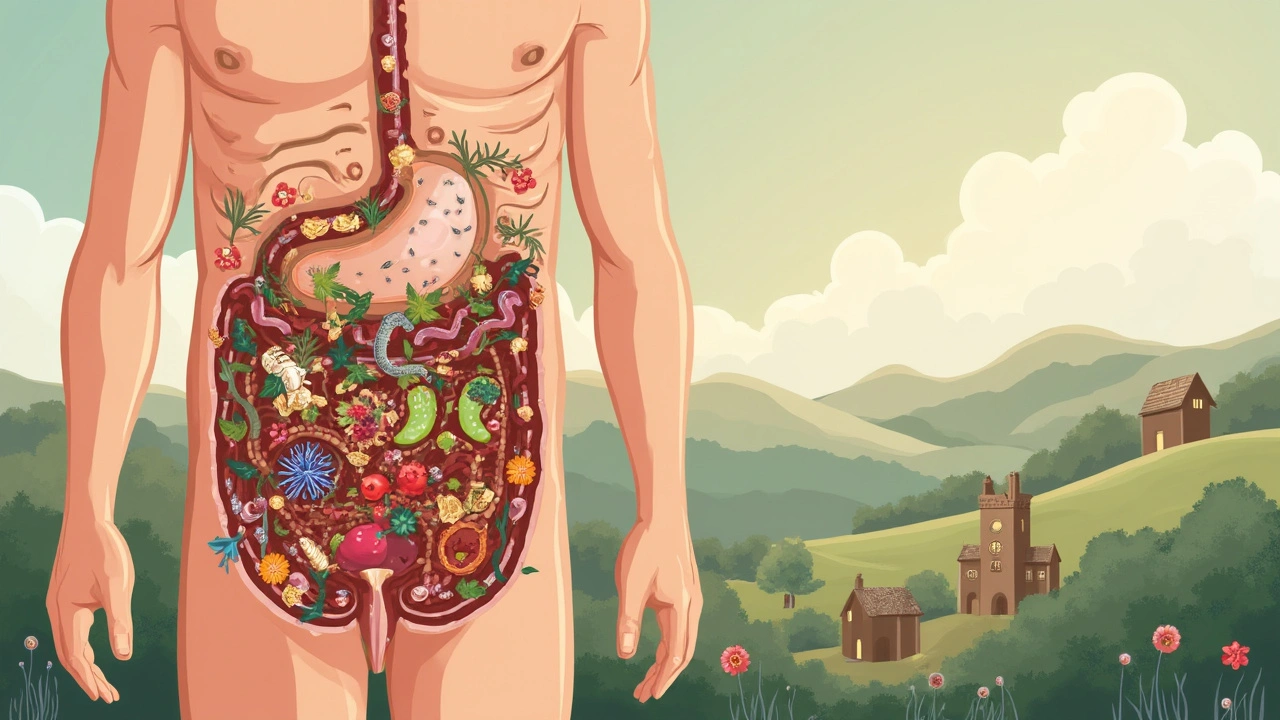If you've tried every diet trick in the book and still struggle with sluggish energy or stubborn weight, it's easy to blame your metabolism. But here's the plot twist: the real culprit might be hiding in your gut, quietly steering how your metabolism works—sometimes for better, sometimes for worse. Hundreds of tiny microbes living in you might be calling more of the shots than you realize, deciding how you extract calories from your food, how your body responds to insulin, and even how hungry you feel from day to day. Science is shining a bright light on these gut bugs right now, and the findings are honestly kind of wild.
The Surprising Role of Your Gut in Metabolism
Metabolism isn't just some mysterious calorie-burning switch. It's this wild network of chemical reactions working behind the scenes—from digesting food, providing energy for your muscles, right down to how your cells repair themselves day after day. For years, folks thought it was mainly down to your genetics and how often you moved your body. But research in the past decade has started flipping that assumption on its head. Now, experts say your digestive tract—especially the gut microbiome—plays a massive part in the metabolic equation.
So what's the gut microbiome? It's this bustling city of microorganisms—trillions of bacteria, fungi, and even viruses—living mostly in your large intestine. They've been part of you since you were born, and they outnumber your human cells 10 to 1. These critters aren’t just passive travelers. They help break down food you wouldn’t be able to digest on your own, like certain fibers, turning them into substances called short-chain fatty acids. Those fatty acids don't just keep your gut lining happy—they also help regulate your blood sugar, cholesterol, and even the way your fat cells behave.
It gets even weirder: Some gut bacteria make compounds that "talk" to your hormones. For example, they can ramp up or dial down hormones that control your appetite, like ghrelin and leptin. Have you ever had a craving for chips or suddenly lost your appetite on a stressful day? Your gut bacteria may have had a hand in that. Studies from 2023 in journals like Cell Reports have shown that people with more gut diversity (that means a bigger variety of different bacteria) tend to have better insulin control and burn energy more efficiently. Less diversity? That often shows up in obesity, metabolic syndrome, and type 2 diabetes.
So it's not about having more bacteria—it’s about having the right mix. Imagine your gut like a garden: If it’s full of weeds, the flowers won’t thrive. A gut packed with good bacteria can defend you from inflammation, help you break down carbs, keep your blood sugar steady, and even reduce the amount of calories you extract from the same piece of pizza. A famous 2021 study from Sweden found people with healthier microbiomes absorbed up to 150 fewer calories a day, just because their bacteria were better at leaving some of those calories behind. It explains why two people eating the same meal can gain or lose weight at totally different rates.
But it goes further than just calories. Your gut bacteria are involved in making B vitamins that your metabolism depends on, like biotin and folate. Some microbes even nudge your thyroid hormones into action, and those are crucial for how fast (or slow) your body burns energy. When your gut gets out of balance—say, from too much processed food or a heavy course of antibiotics—metabolic chaos can follow: blood sugar swings, slow fat burning, foggy brain, and feeling wiped out after meals.

Real-World Gut Health Myths and Surprises
Gut health trends have exploded lately, but some advice is built on guesswork, not real science. No, you don't need to live off celery juice or guzzle kombucha 24/7 to have a happy gut. In fact, too much of a "good" thing sometimes backfires. For instance, chugging fiber supplements without drinking enough water can mess with your digestion and actually feed the wrong types of bacteria. On the flip side, ultra-processed foods (think packaged snacks, frozen dinners, soda) can starve your beneficial microbes and let more harmful bugs take over.
What about probiotics? Not all probiotic supplements are created equal, and not everyone needs them. Some brands toss in random strains that might not even make it down to your colon alive. If you’re looking for those bacteria to stick around and build a strong gut, it’s often better to focus on prebiotic foods (what those good bacteria eat) rather than just popping a pill. Prebiotics show up in things like ripe bananas, garlic, onions, asparagus, and oats. Some research published in 2024 in Nature Microbiology found that eating at least three servings of prebiotic-rich foods a week boosts the types of bacteria most linked with steady metabolism and lower inflammation.
Fermented foods, on the other hand, really can make a difference—but variety matters here too. Yogurt and kefir are famous choices, but don't overlook sauerkraut, kimchi, miso, or even pickled onions. Each one brings in slightly different strains and types of friendly microbes. And no, you can't just “reset” your gut with a detox tea or some miracle powder. Gut health is something you build day by day, meal by meal.
Here's a twist many people miss: Your mood is tied to your gut. Picture this—90% of your body's serotonin (the famous feel-good brain chemical) is made in your gut, not your brain. When your gut microbes are off, it isn’t just digestion that suffers—you might notice more anxiety, irritability, or trouble sleeping. One University College London study published in 2022 even linked gut imbalances to changes in how the body stores belly fat, especially during stressful times.
Lifestyle habits also count. Inconsistent sleep or skipping meals can put your gut out of whack, throwing your metabolism along for the ride. Even small, everyday stuff makes a surprising difference—like chewing your food well, taking time to enjoy your meals, and walking after you eat. And antibiotics? Super helpful if you have a nasty infection, but a single week-long course can knock out some of your friendly bacteria for months. That's why doctors are getting pickier about when to prescribe them today.
It’s not all about what you avoid. Adding in foods that feed your good bacteria can shift things in your favor pretty quickly. People who eat 30+ different plant foods a week—legumes, veggies, fruits, seeds, nuts—have more diverse, resilient microbiomes, according to a massive 2021 study from the American Gut Project. So think of every new veggie you try as feeding a whole new crew of helpful microbes.

Simple Ways to Boost Gut Health and Your Metabolism
Looking for easy steps to start supporting your gut—and by extension, your metabolism—right away? No need to complicate things. Here’s what works, according to the latest science:
- gut health comes from diversity: Try to eat different colors and types of fruits and veggies every week. Swap out your usual salad mix for arugula one week, then try Swiss chard or dandelion greens.
- Include some kind of fermented food a few times a week. Rotate through yogurt, miso soup, kimchi, and maybe even tempeh. Don’t like one? Don’t stress. Just try another.
- Add prebiotic foods: sliced bananas with oatmeal, roasted garlic in potatoes, or leeks in your salad all help feed the right bacteria.
- Stay hydrated. Water keeps digestion moving and supports the balance of bacteria. If you’re increasing fiber, drinking enough is even more important.
- Cut back a little on ultra-processed snacks. Even switching from sweetened yogurt to plain and adding your own fruit can tip things in the right direction.
- Move a bit every day. A walk after meals can boost digestion, help blood sugar, and may even shift your gut bacteria towards those linked with leaner body types.
- Prioritize sleep. Missing out on rest can let unhealthy strains take hold in your gut and tank your metabolism the next day, making you crave junk food.
- Manage stress—easy to say, trickier to do. But even ten minutes of deep breathing can send signals through your gut-brain axis, telling your body to chill and your digestion to get back on track.
- Be smart with antibiotics. If your doctor says you need them, ask about taking a course of probiotics when the prescription is done, and eat more fermented foods to help replenish your microbiome.
No magic pill or perfect food will fix everything overnight. But small changes add up, and your gut responds quickly if you give it what it loves. People who start with even tiny tweaks to their diets—like aiming for five different plant foods in a day—often notice less bloating, steadier energy, and even better mood within a couple weeks.
The science is still evolving, but one thing is clear: Your gut isn't just along for the ride—it's steering your metabolism more than you think. Start treating those ten trillion bacteria like friends, and they'll help you run smoother, feel lighter, and get more out of every meal you eat.





